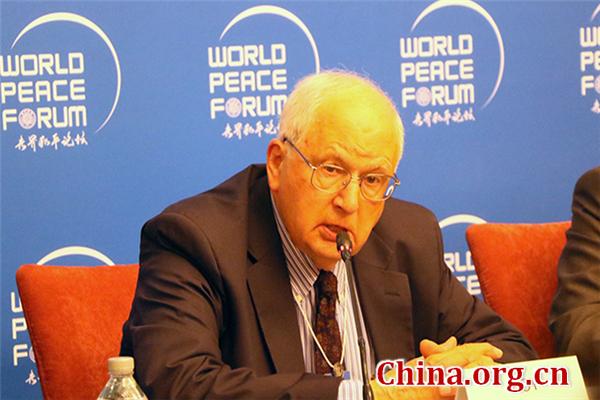Former US ambassador to China: Wrong to use tariffs to force other countries
- By Zhang Jiaqi
 0 Comment(s)
0 Comment(s) Print
Print E-mail China.org.cn, July 16, 2018
E-mail China.org.cn, July 16, 2018
Using tariffs as a way to force other countries to do what you would like them to do is the wrong way to go about it, said J. Stapleton Roy, former U.S. ambassador to China from 1991 to 1995, speaking in Beijing on July 15. He added that many American people believe the same.

Roy also said that though trade disputes may threaten the interests of both China and the U.S., the bilateral relationship would remain as important as ever, and that good China-U.S. relations are in America's interest.
Roy explained that he served at a time when China-U.S. relations developed very smoothly and rapidly along a positive path, yet at the same time U.S. public opinion was hostile to China and bilateral relations were filled with problems. Regardless, he said, the relationship has always remained important.
"The strains in the relationship have increased in recent weeks because of the trade war emerging, but it has not yet taken on its full course, and we have not yet seen the consequences of the trade war in how it will affect American consumers, nor can we predict the seriousness and scale of the problem," Roy said.
The former ambassador came to Beijing to attend the seventh World Peace Forum held in Tsinghua University on July 14 and 15. During the two-day discussions, Roy said he saw that the Chinese people were very concerned about the China-U.S. relationship and did not know where the trade disputes would lead, and he believed that their concern might impact bilateral ties.
"There was real concern in China mirroring that in the U.S. about the current state of the China-U.S. relationship," he said. But he also added that as he sees it, the potential for cooperation with China remains very real.
He discovered in his talks with Chinese officials and scholars who followed China-U.S. relations closely that there is still great interest in finding ways to keep China and the U.S. working together on a whole range of issues.
Using the metaphor of a two-way street, he called for both countries to offer fairer treatment to foreign companies and emphasized that China should pay attention to why the U.S. was angry about the trade relationship. At the same time, he stressed that the U.S. should likewise heed China's grievances, and attempt to handle trade relations in an effective and fair manner that could be applicable to other countries as well.
Born and raised in China, Roy got involved in China-U.S. affairs as early as 1978, witnessing China's development and participating in the growth of China-U.S. relations. On the topic of China's progress over the last 40 years of reform and opening up, he said he could not exaggerate his admiration for the country's accomplishments in terms of the speed of economic development and the degree to which living standards have been raised throughout the country.
"The significant thing to me about the 40 years of reform and opening up is that most of that development went into raising living standards and economic development," he said, while also calling attention to China's need, as an emerging major player, to take precautions regarding the misuse of its power.





